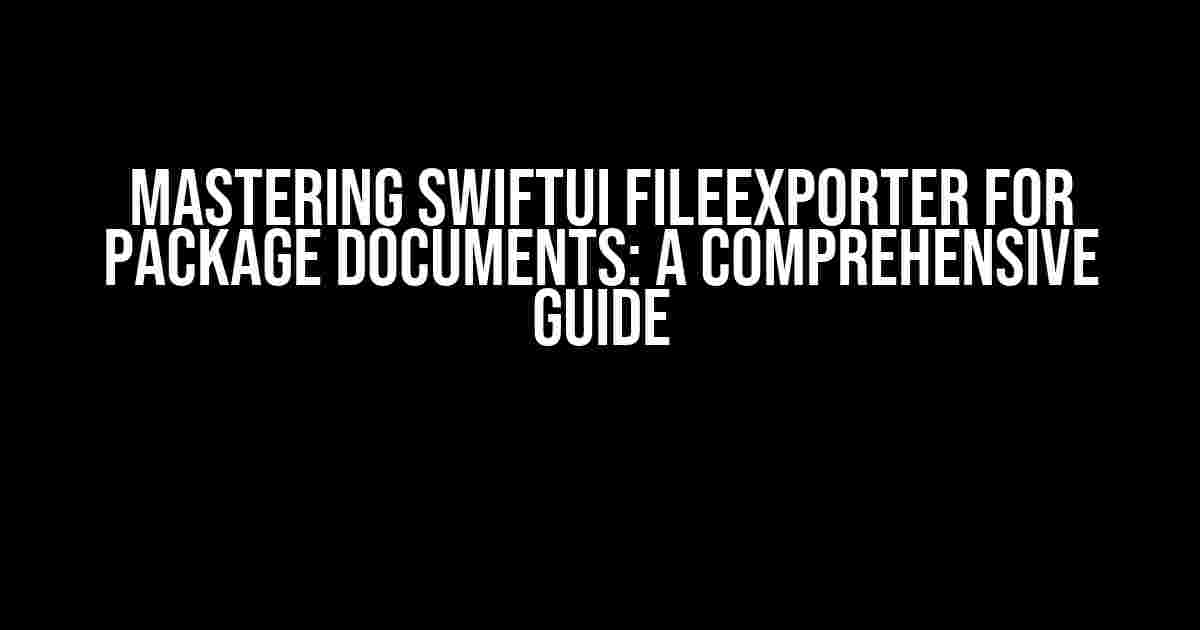Are you tired of struggling with file exportation in your SwiftUI app? Do you want to learn how to seamlessly export package documents with ease? Look no further! In this article, we’ll dive into the world of SwiftUI’s FileExporter and explore its capabilities for exporting package documents. By the end of this guide, you’ll be a master of SwiftUI FileExporter and ready to take your app to the next level.
What is SwiftUI FileExporter?
Before we dive into the nitty-gritty, let’s take a step back and understand what SwiftUI FileExporter is. FileExporter is a built-in SwiftUI view that allows you to export files from your app to the user’s device. It’s a powerful tool that can be used to export various types of files, including text files, images, and even package documents.
Why Use SwiftUI FileExporter for Package Documents?
So, why should you use SwiftUI FileExporter for package documents? Here are a few compelling reasons:
- Easy Integration**: FileExporter is a native SwiftUI view, making it easy to integrate into your existing app.
- Seamless Exportation**: FileExporter allows users to export package documents with ease, providing a seamless experience.
- Customizable**: You can customize the exportation process to fit your app’s specific needs.
- Device Compatibility**: FileExporter is compatible with a wide range of devices, ensuring that your app can reach a broader audience.
Setting Up FileExporter for Package Documents
To get started with FileExporter, you’ll need to create a new SwiftUI view and add the `FileExporter` view to it. Here’s an example:
import SwiftUI
struct PackageDocumentExporter: View {
@State private var isShowingExporter = false
@State private var exportedFile: URL?
var body: some View {
Button("Export Package Document") {
isShowingExporter = true
}
.fileExporter(
isShowing: $isShowingExporter,
content: {
let packageDocument = // Create your package document here
return packageDocument
},
defaultFilename: "package_document.pckg"
) { result in
if let fileURL = result {
exportedFile = fileURL
}
}
}
}
In this example, we’ve created a `PackageDocumentExporter` view that displays a button labeled “Export Package Document”. When the button is tapped, the `FileExporter` view is presented, allowing the user to select a location to export the package document.
Customizing the Exportation Process
One of the most powerful features of FileExporter is its customizability. You can customize the exportation process to fit your app’s specific needs. Here are a few examples:
Specifying a Custom File Type
By default, FileExporter exports files as `.txt` files. However, you can specify a custom file type using the `defaultFilename` parameter. For example:
.fileExporter(
isShowing: $isShowingExporter,
content: {
let packageDocument = // Create your package document here
return packageDocument
},
defaultFilename: "package_document.custom"
)
In this example, we’ve specified a custom file type of `.custom`. This will allow users to export package documents with a `.custom` file extension.
Specifying a Custom File Name
You can also specify a custom file name using the `defaultFilename` parameter. For example:
.fileExporter(
isShowing: $isShowingExporter,
content: {
let packageDocument = // Create your package document here
return packageDocument
},
defaultFilename: "My Package Document \(Date.now)"
)
In this example, we’ve specified a custom file name that includes the current date and time. This will allow users to export package documents with a unique file name.
Troubleshooting Common Issues
Like any powerful tool, FileExporter can sometimes throw errors or behave unexpectedly. Here are a few common issues and their solutions:
This error typically occurs when the `FileExporter` view is unable to access the file system. To fix this issue, ensure that your app has the necessary permissions to access the file system.
This error typically occurs when the `FileExporter` view is not properly configured. To fix this issue, ensure that the `FileExporter` view is properly instantiated and configured.
Best Practices for Using FileExporter
To get the most out of FileExporter, here are some best practices to keep in mind:
- Clearly Label Export Buttons**: Clearly label export buttons to ensure that users understand what they’re exporting.
- Provide Clear Instructions**: Provide clear instructions on how to export package documents to avoid confusion.
- Test Thoroughly**: Test the exportation process thoroughly to ensure that it works as expected.
- Customize the Exportation Process**: Customize the exportation process to fit your app’s specific needs.
- Monitor User Feedback**: Monitor user feedback to identify areas for improvement.
Conclusion
In conclusion, SwiftUI FileExporter is a powerful tool that can revolutionize the way you export package documents in your app. By following this comprehensive guide, you’ll be well on your way to mastering FileExporter and providing a seamless exportation experience for your users. Remember to customize the exportation process, troubleshoot common issues, and follow best practices to get the most out of FileExporter.
| Pros | Cons |
|---|---|
| Easy to integrate | Limited customization options |
| Seamless exportation experience | Requires permission to access file system |
| Device compatible | Occasional errors and bugs |
We hope you found this article informative and helpful. Happy coding, and don’t hesitate to reach out if you have any further questions or need help with implementing FileExporter in your app!
Here are 5 Questions and Answers about “SwiftUI fileExporter for package documents” in a creative voice and tone:
Frequently Asked Question
Get the answers to your burning questions about SwiftUI fileExporter for package documents!
What is SwiftUI fileExporter, and how does it help with package documents?
SwiftUI fileExporter is a powerful tool that allows you to export files and documents from your SwiftUI app. When it comes to package documents, SwiftUI fileExporter makes it easy to export them in various formats, such as PDF, DOCX, or TXT, making it convenient to share or store them outside of your app.
How do I use SwiftUI fileExporter to export a package document?
To export a package document using SwiftUI fileExporter, you’ll need to create an instance of the `FileExporter` class and specify the document you want to export. Then, use the `export` method to export the document in your desired format. You can also customize the export process by specifying options like file name, location, and more!
Can I customize the export process with SwiftUI fileExporter?
Absolutely! SwiftUI fileExporter provides various options for customizing the export process. You can specify the file format, file name, and location, as well as add custom metadata or headers to the exported file. This gives you full control over how your package documents are exported and ensures they meet your specific requirements.
Is SwiftUI fileExporter compatible with all types of package documents?
SwiftUI fileExporter supports a wide range of package document formats, including PDF, DOCX, XLSX, PPTX, and more. However, the compatibility may vary depending on the specific document format and the app’s configuration. You can always check the SwiftUI fileExporter documentation for the most up-to-date information on supported formats.
How do I troubleshoot issues with SwiftUI fileExporter for package documents?
If you encounter any issues with SwiftUI fileExporter for package documents, start by checking the official documentation and troubleshooting guides. You can also search for online forums and communities, like the SwiftUI developer forum, where you can ask for help and get feedback from experienced developers. Don’t hesitate to reach out to the SwiftUI fileExporter support team for further assistance!


